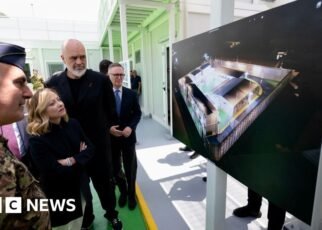Italy, which receives the most migrant arrivals in the European Union, is partially outsourcing the challenge from today, as it opens the first of two planned camps in neighbouring Albania.
The centres will be used to house up to 3000 migrants per month rescued en route to Italy as part of Europe’s first “offshoring” scheme, while the continent grapples with how to respond to the challenge of irregular migration.
The camp that opens today is located in the northern Albanian port of Shengjin. The opening of a second centre, on a former air force base in nearby Gjader, has been delayed.
The structures will be entirely managed by the Italian government, which paid for their construction.
They will be used for migrants picked up in international waters – though not women, children, or those deemed vulnerable.
Once there, they will be allowed to request asylum in Italy. If refused, they will be sent back to countries deemed safe to return.
“Italian and European legislation will be applied in these centres,” Fabrizio Bucci, Italy’s ambassador in Albania, told me. “It’s like having a centre in Italy – but in Albania.”
The agreement signed by the Italian and Albanian Prime Ministers will remain in place for five years – with the option to extend if it proves successful in reducing the migrant burden on Italy and deterring some from attempting to come.
Arrivals in Italy by sea this year – around 31,000 so far – are down by more than half from the same period in 2023.
Giorgia Meloni, the Italian Prime Minister, ran for office promising to clamp down hard on migration – and the Albania plan has become a key tenet of that.
The hefty price tag, estimated at upwards of €650m (£547), is one of the criticisms levelled by Italian opposition politicians and human rights groups.
“It’s an excessive cost to detain a limited number of migrants”, said Roberto Magi, an MP with the left-wing +Europa party.
When Ms Meloni recently visited the site in Albania, he approached her car to protest – and was grabbed by Albanian security officials. As she intervened, telling them to ease off, he shouted: “If they treat an elected MP like this, imagine how they’ll treat the migrants”.
Speaking to the BBC, he compared the structures to a penal colony.
He also doubted the ability of night-time rescuers to properly screen those picked up to ensure that no vulnerable individuals are sent to Albania.
“They won’t be able to delve deep into whether somebody has suffered torture or sexual violence or discrimination due to their sexuality back in Africa”, Mr Magi said.
“It’s all an attempt at dissuasion and a PR show to tell Italians this is the first time a government can keep migrants out. But nobody who has risked their life to cross to Italy will be discouraged.”
Fabrizio Bucci, the Italian ambassador in Tirana, disagrees. “It’s one of the elements that migrants and smugglers will have to factor in,” he said.
“What do we have to lose? We’ve been trying to redistribute migrants throughout the EU and it hasn’t worked. So why not try to chart a new way?” He refers to it as an experiment that, if successful, could be replicated.
Indeed, 15 EU members, led by Denmark, recently wrote an open letter to the European Commission backing the outsourcing of migration. Sir Keir Starmer praised the Italy-Albania deal after meeting both Prime Ministers.
It has drawn comparison with the plan of the previous Conservative government to deport failed asylum seekers from the United Kingdom to Rwanda – ditched by Mr Starmer.
But the agreements are significantly different.
While Rwanda would have managed the asylum requests and centres under its deal, giving successful claimants asylum there and deporting failed ones to third countries deemed safe by the Rwandan government, the Albania deal will be under Italian jurisdiction.
“We made sure the Albanian legislation was already in full compliance with EU and international laws”, said Ambassador Bucci.
For Albania, the reward is a boost to its image as it negotiates European Union membership.
But Vladimir Karaj, a Tirana-based journalist with the Balkan Investigative Reporting Network, said it was a “complete surprise” when it was announced by the Prime Minister Edi Rama. Before the Rwanda deal was struck, there were reports that Britain was aiming for an agreement with Albania, which Mr Rama forcefully shot down.
“He claimed he was strictly against this kind of treatment for refugees”, he said. “So when Albania struck the deal with Italy, there was huge speculation over what Rama was gaining personally.”
Mr Karaj says there’s no “smoking gun”: “The government’s narrative is that Italy is our best friend and took in Albanians when our dictatorship fell in the 1990s.”
The deal, Mr Karaj said, has been met only with short-lived protests by some claiming it was aimed at replacing Albanians with foreigners, or giving away territory to Italy.
He suspects other countries may now come knocking on Albania’s door.
“Albania needs the support it can get from the west”, he said. “If western governments like the UK or Germany see this is a solution, I don’t think Rama’s words about it just being for Italy will be that easy to sell.”



